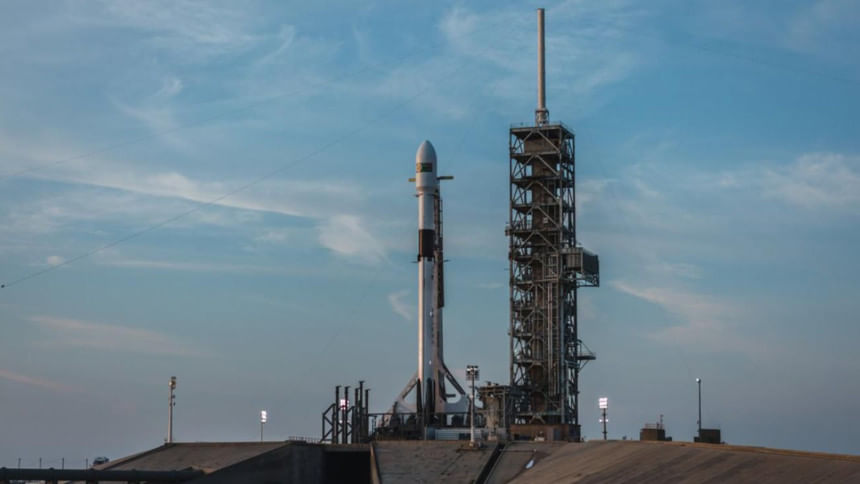Some thoughts on Bangladesh's first full-scale communication satellite

On May 11 at 4:14pm US east coast standard time, Bangladesh entered the space technology history books as the latest iteration of the Falcon 9 rocket by SpaceX took off from the Kennedy Space Center Launchpad 39A in Cape Canaveral, Florida. The launch marked two historic firsts—it set into orbit the first full-scale communication satellite owned and operated by the sovereign nation of Bangladesh, and it did so on the latest and "baddest" upgrade to Falcon 9 rocket identified as Block 5.
Of course, the whole nation is overjoyed at this space-age feat though riding on the tried and tested technological chops of two global giants—Thales Alenia Space of France that designed and built the satellite and SpaceX of California that launched the three-and-half ton communication satellite without a hitch. Some people, however, are asking if we really need a satellite in space costing Tk 3,000 crore when we have stark deficiencies in many areas of basic infrastructure—whether such extravagance is justified when more than a tenth of the population is still struggling under the yoke of extreme poverty.
These are quite reasonable questions no doubt, and on the face of it, may appear quite cogent. What, however, is missing from this line of questioning is that in today's world, a communication satellite is as much a part of basic utility as a large-scale power plant or a liquefied natural gas (LNG) terminal—all these require advanced technology, cost hundreds of millions of dollars, and at the same time, are essential components of overall infrastructure that any nation state must possess to thrive. When countries with a similar economic size (in terms of both gross and per capita) as Bangladesh operate multiple satellites—such as Pakistan having three, Egypt having five, Nigeria having six—and economies that are less than a fifth of ours such as Azerbaijan and Laos own satellites, I don't think anyone needs to fret over Bangladesh spending a few hundred million dollars for a communication satellite of its own.
As a matter of fact, the launching of Bangladesh's first communication satellite—Bangabandhu Satellite 1, named after the Father of the Nation—could not have come at a more auspicious time. The timing coincided with the culmination of the final upgrades to the Falcon 9 rocket by SpaceX, and Bangabandhu Satellite 1 became the first and only payload on the debut launch of the Block 5 version of the rocket. Rocket enthusiasts from around the world have closely followed the maiden launch of the Block 5 giving Bangladesh's first communication satellite wide publicity and recognition.
From a utilitarian point of view, this satellite will barely meet our needs with a data transmission capacity of 1.6 Gbps. This capacity will be used up quite quickly as we fill the gaps in geographic coverage of voice and Internet data communication in the outlying areas or start providing emergency data backup lines for essential telecom services or get existing satellite television broadcasters to switch from foreign carriers to our own. In fact, an economy our size should plan on launching and operating multiple satellites for data communication, global positioning system (GPS) service and state security. The capacity of Bangabandhu Satellite 1 is tiny even in comparison to our submarine data transmission capacity which is around 1,600 Gbps or a thousand-fold higher.
There are more than a thousand operating and twice as many defunct satellites in orbit around the earth. Just as airlines need route licenses and airport time slots to operate aircraft to and from various airports, each country or regional organisations need space slots and orbital licenses to operate satellites. There is a limited capacity of satellites in geostationary orbits circling the planet at an altitude of 36,000 km (like Bangabandhu Satellite 1) or in low earth orbits making multiple rotations per day at a height of 2,000 km or less. As such a competition for orbital licenses and space slots among nations and regional bodies is quite intense. If Bangladesh remains idle, then space slots that naturally should be ours could be taken up by other nations. As a matter of fact, even for Bangabandhu Satellite 1, Bangladesh had to buy the orbital slot from Russia at a hefty price of USD 28 million.
On the business side of things, looking at Bangladesh's first communication satellite purely on a return-on-investment (ROI) basis makes it quite lucrative with a break-even point projected in seven years. Most large-scale utility projects have much longer break-even points. The only calumny so far has been the "alleged" assignment of the overseas marketing rights of the excess capacity of the satellite without following due process. If this be true, then as a humble citizen and a tech enthusiast, I would certainly urge the appropriate authorities to take necessary measures to remove this blot from the firmament of the nation's most spectacular achievement in space.
Habibullah N Karim is an author, policy activist, investor and serial entrepreneur. He is a founder and former president of BASIS and founder/CEO of Technohaven Company Ltd.
Email: [email protected]





Comments